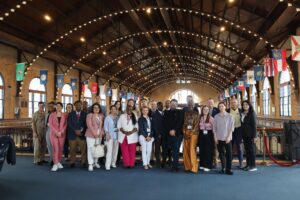
WASHINGTON, D.C. (October 11, 2024) – The McCain Institute at Arizona State University (ASU) kicked off the 2024 McCain Global Leaders (MGLs) fellowship program this month with a visit to Washington D.C. and Annapolis, Md. The cohort,comprised of 22 leaders from 21 countries and six continents, are embarking on a twelve-month fellowship designed to empower the next generation of character-driven leaders, like Senator McCain, to tackle global challenges.
The fellows visited the Naval Academy, where Senator McCain served as a midshipman until his graduation in June 1958, and had conversations with journalists and policy experts. They met with U.S. Senator Mark Kelly (D-Ariz.) on Capitol Hill, had exclusive access to White House press briefings, and toured George Washington’s Mount Vernon home.
“Each of the individuals selected for the McCain Global Leaders program represents the best hope to combat global challenges related to democracy and human rights. The McCain Institute is honored to host them in the United States as they retrace the leadership journey of Senator McCain and meet with top officials in Washington to help inform and inspire their work,” said McCain Institute Assistant Director for Global Leadership Scott Nemeth. “The legacy of Senator McCain is as timely as ever. The diverse group of leaders that gathered in Annapolis and Washington are vital to ensuring a better tomorrow for the global community.”
MGLs met with program alumni, MGL Advisory Council members, Jack McCain, and McCain Institute program directors to better understand the significance and impact of their work. Experts from the U.S. Department of State, the White House National Security Council, U.S. Naval Academy, U.S. Global Leadership Coalition, International Republican Institute, National Endowment for Democracy, and staff from U.S. Senator Sheldon Whitehouse’s (D-R.I.) office also spoke with the delegation about American politics, global challenges, human rights and democracy.
“One of the hallmarks of this program is that it is not theoretical. Instead, it convenes leaders from around the world to discuss real-world challenges and identify solutions to those challenges. In Washington and Annapolis leaders not only learned about threats to democracy in the United States and globally, but discussed with leading experts how to solve them and what they can do in their home countries and regions to defend democracy and human rights,” said MGL Advisory Council Member Nate Mook.
“This visit was an invaluable opportunity for me to discuss with my fellow McCain Global Leaders and experts the challenges we face in Zimbabwe and throughout the broader region of sub-Saharan Africa. From the panel discussions to the special visits to the U.S. Congress and White House, I was able to take away key learnings that will help me as a defender of democracy and as a leader in Zimbabwe,” said MGL Takudzwa Ngadziore. “Being able to bridge the gap between cultures and experiences provides for a global network that will help us take on serious challenges in the world around us.”
The Asia regional members of the cohort will travel to Taipei, Taiwan, in November as the next stop in the MGL program. Follow along on the McCain Institute’s Instagram and Twitter/X.
Learn more about the McCain Institute’s McCain Global Leaders Program HERE.
About the McCain Institute at Arizona State University
The McCain Institute is a nonpartisan organization inspired by Senator John McCain and his family’s dedication to public service. We are part of Arizona State University and based in Washington, D.C. Our programs defend democracy, advance human rights and freedom, and empower character-driven leaders. Our unique power to convene leaders across the global political spectrum enables us to make a real impact on the world’s most pressing challenges. Our goal is action, not talk, and like Senator McCain, we are fighting to create a free, safe, and just world for all.
About Arizona State University
Arizona State University has developed a new model for the American research university, creating an institution that is committed to access, excellence and impact. ASU measures itself by those it includes, not by those it excludes. As the prototype for a New American University, ASU pursues research that contributes to the public good, and ASU assumes major responsibility for the economic, social and cultural vitality of the communities that surround it.